Related Research Articles

Diamond Dogs is the eighth studio album by the English musician David Bowie, released on 24 May 1974 through RCA Records. Bowie produced the album and recorded it in early 1974 in London and the Netherlands, following the disbanding of his backing band the Spiders from Mars and the departure of producer Ken Scott. Bowie played lead guitar on the record in the absence of Mick Ronson. Diamond Dogs featured the return of Tony Visconti, who had not worked with Bowie for four years; the two would collaborate for the rest of the decade. Musically, it was Bowie's final album in the glam rock genre, though some songs were influenced by funk and soul music, which Bowie embraced on his next album, Young Americans (1975).
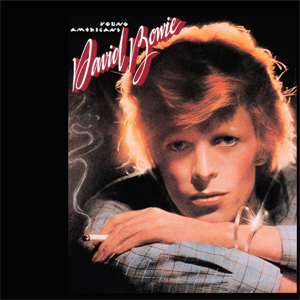
Young Americans is the ninth studio album by the English musician David Bowie, released on 7 March 1975 through RCA Records. A departure from the glam rock style of previous albums, the record showcased Bowie's interest in soul and R&B. Music critics have described the sound as blue-eyed soul; Bowie himself labelled the album's sound "plastic soul".
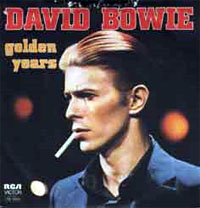
"Golden Years" is a song by the English musician David Bowie, released by RCA Records on 21 November 1975 as the lead single from his tenth studio album Station to Station (1976). Partially written before Bowie began shooting for the film The Man Who Fell to Earth (1976), the song was mostly compiled in the studio and was the first track completed for the album. Co-produced by Bowie and Harry Maslin, recording took place at Cherokee Studios in Los Angeles during September 1975. Due to Bowie's heavy cocaine use, he later recalled remembering almost nothing of Station to Station's production.
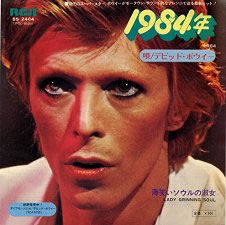
"1984" is a song by the English musician David Bowie, from his 1974 album Diamond Dogs, released as a single in the United States and Japan. Written in 1973, it was inspired by George Orwell's Nineteen Eighty-Four and, like much of its parent album, originally intended for a stage musical based on the novel, which was never produced because permission was refused by Orwell's widow Sonia.
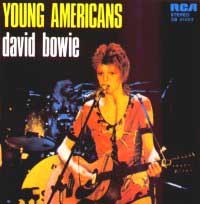
"Young Americans" is a song by the English singer-songwriter David Bowie from his ninth studio album of the same name. It was mostly recorded in August 1974 at Sigma Sound Studios in Philadelphia and was debuted on the Soul tour the following month. The song featured contributions from then-unknown singer Luther Vandross, who conceived the backing vocal arrangement. An embracement of R&B and Philadelphia soul, the song presents an Englishman's impressionist portrait of America at the time, featuring various characters and allusions to American totems and events.

"John, I'm Only Dancing" is a song by the English musician David Bowie, originally released as a non-album single on 1 September 1972. A glam rock and R&B number, the lyrics describe a situation in which the narrator informs his lover not to worry about the girl he is with because he is "only dancing" with her. Although ambiguous, many interpreted it as concerning a gay relationship. Recorded in London in June 1972, it was boosted by a low-budget promotional video directed by Mick Rock. It reached number 12 in the UK; RCA refused to release it in America due to its suggestive lyrical content.

"Sorrow" is a song first recorded by the McCoys in 1965 and released as the B-side to their cover of "Fever". It became a big hit in the United Kingdom in a version by the Merseys, reaching number 4 on the UK chart on 28 April 1966. A version by David Bowie charted worldwide in 1973.
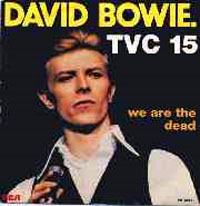
"TVC 15" is a song by the English musician David Bowie, released on his 1976 album Station to Station. RCA Records later released it as the second single from the album on 30 April 1976. The song was recorded in late 1975 at Cherokee Studios in Los Angeles. Co-produced by Bowie and Harry Maslin, the recording featured guitarists Carlos Alomar and Earl Slick, bassist George Murray, drummer Dennis Davis, pianist Roy Bittan and Warren Peace on backing vocals. The upbeat song is mostly art rock performed in a style reminiscent of the 1950s. Lyrically, the song concerns a character's girlfriend being eaten by a television set. It was inspired by a dream of Iggy Pop's and Bowie's role in The Man Who Fell to Earth (1976). Some lyrics are also influenced by the Yardbirds and Kraftwerk.
Geoffrey Alexander MacCormack, better known as Warren Peace, is an English vocalist, composer and dancer best known for his work with David Bowie in the 1970s.

"Velvet Goldmine" is a song by the English singer-songwriter David Bowie. A glam rock number with lyrical references to oral sex, it was originally recorded on 11 November 1971 at Trident Studios in London during the sessions for his 1972 album The Rise and Fall of Ziggy Stardust and the Spiders from Mars. It was ultimately left off the album and subsequently released as a B-side of the UK re-release of "Space Oddity" in 1975. Praised by biographers as an undervalued classic, it later appeared on compilation albums, including on Re:Call 1, part of the Five Years (1969–1973) boxed set, in 2015. Its namesake was used for Todd Haynes's 1998 film of the same name.
"Panic in Detroit" is a song written by the English singer-songwriter David Bowie for the album Aladdin Sane in 1973. Bowie based it on his friend Iggy Pop's descriptions of revolutionaries he had known in Michigan and Pop's experiences during the 1967 Detroit riots. Rolling Stone magazine called the track "a paranoid descendant of the Motor City's earlier masterpiece, Martha and the Vandellas' "Nowhere to Run"".

"Rock 'n' Roll with Me" is a power ballad written by David Bowie and Geoff MacCormack and recorded in January 1974 that first appeared on Bowie's Diamond Dogs album, supposedly to address the artist's complex relation with his fans. A version recorded during the Diamond Dogs tour in July 1974 was released on the album David Live.
"Big Brother" is a song written by David Bowie in 1973 and intended for his never-produced musical based on George Orwell's Nineteen Eighty-Four. In 1974 it was released on the album Diamond Dogs. It segued into the final track on the record, "Chant of the Ever Circling Skeletal Family".
"Fascination" is a song written by the English singer-songwriter David Bowie and the American musician Luther Vandross for Bowie's Young Americans album in 1975. The song originated from a Vandross song called "Funky Music " which The Mike Garson Band used to play before Bowie concerts in 1974.

"Can You Hear Me?" is a ballad by the English musician David Bowie from his 1975 album Young Americans. Bowie called it a "real love song", written with someone in mind, but he did not identify them. The song was released as a single in November 1975 on the B side of "Golden Years".
"Word on a Wing" is a song written and recorded by the English singer-songwriter David Bowie in 1975 for the Station to Station album, where it appears as the closing track of the LP's first side.
"Scream Like a Baby" is a song written by David Bowie. It appears on the 1980 album Scary Monsters .

Cracked Actor is a live album by the English singer-songwriter David Bowie. It was released posthumously as a Record Store Day release on 22 April 2017 through Parlophone record label. Produced by Bowie and mixed by Tony Visconti, it was recorded on the Diamond Dogs Tour in September 1974, some material from which appeared in the BBC documentary Cracked Actor.

I'm Only Dancing is a live album by the English musician David Bowie. It had a limited release on 29 August 2020 for Record Store Day as a double LP and double CD. It was recorded on the second half of the Diamond Dogs Tour in 1974, which is known as "the Soul Tour" due to the influence of the then-unreleased material Bowie had begun recording for Young Americans (1975). I'm Only Dancing marks the first time performances from this portion of the tour have been officially released.

Ava Cherry is an American singer and model. She collaborated with English musician David Bowie between 1972 and 1975; the two met in New York City when she was a nightclub waitress and Bowie was touring for The Rise and Fall of Ziggy Stardust and the Spiders from Mars. Afterwards, they began a period of personal and artistic collaboration that heavily influenced the Young Americans "blue-eyed soul" era. Following this, she struck out as a solo singer and backing artist for musicians such as Luther Vandross and Chaka Khan.
References
- 1 2 Pegg, Nicholas (2016). The Complete David Bowie (7th ed.). London: Titan Books. p. 780. ISBN 978-1785653650.
- 1 2 O'Leary, Chris (2015). Rebel Rebel: All the Songs of David Bowie from '64 to '76. Alresford, Hants: Zero Books. pp. 373–374. ISBN 978-1-78099-244-0.
- 1 2 Chapman, Ian (2015). Experiencing David Bowie: A Listener's Companion. London: Rowman & Littlefield Publishers. pp. 108–109. ISBN 978-1442237513.
- ↑ Petridis, Alex (22 September 2016). "David Bowie: Who Can I Be Now? (1974–1976) review – an artist on the edge". The Guardian.
- 1 2 3 Pegg 2016, p. 226.
- 1 2 O'Leary, Chris (28 October 2010). "Right". Pushing Ahead of the Dame.